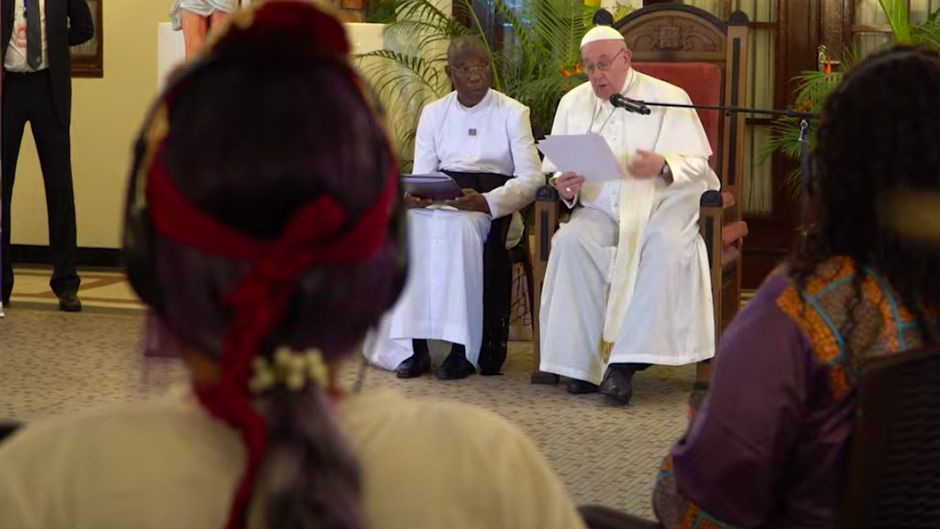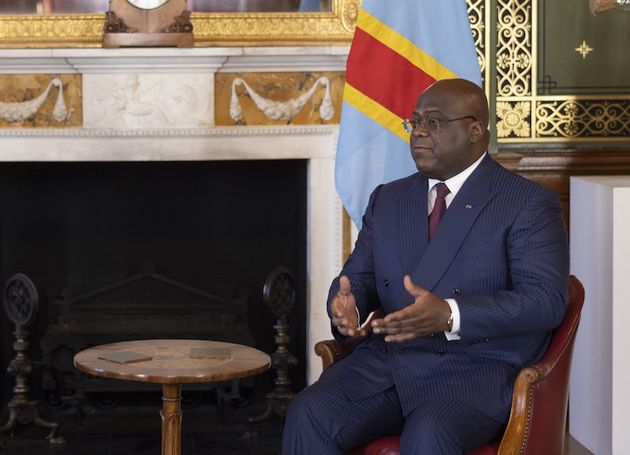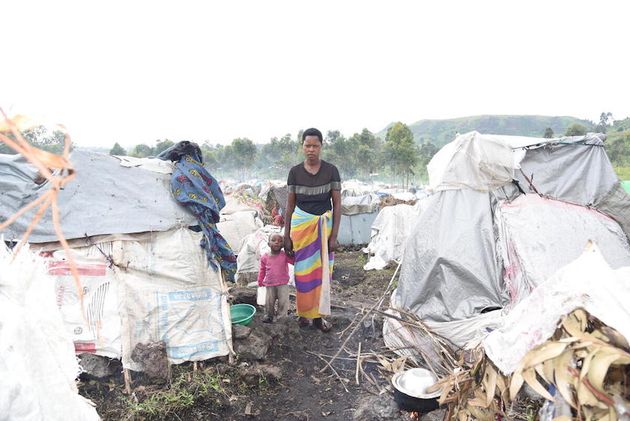Congolese Christians are sceptical about the humanist statements made by Pope Francis during his official visit to a country facing a serious conflict.
 Francis in one of his speeches during his visit to the Democratic Republic of Congo / Screenshot, YouTube.
Francis in one of his speeches during his visit to the Democratic Republic of Congo / Screenshot, YouTube.
Pope Francis acknowledged that the reason for his official visit to the Democratic Republic of Congo (DRC) was "to bring you the closeness, affection and consolation of the entire Church, and to learn from your example of patience, courage and struggle".
"The Church and the Pope have confidence in you; they believe in your future, in the future that is in your hands", Francis said on his 40th trip.
With 64% of the population living with less than two euros a day, and 15 million children in need of urgent humanitarian assistance, according to World Vision, the situation in DRC seems to demand more relevant moves from the international community, including the Vatican State.
Francis' visit to the Democratic Republic of Congo has come in a year in which the country will return to the polls to choose its president, following Felix Tshisekedi's victory in 2018 ending the Kabila dynasty.
Many had high expectations of the historic opposition leader now occupying the presidency, but his tenure has highlighted the state's disintegration and the distance between Kinshasa and the east of the country.
"The DRC is a huge and ungovernable country. There is a ministry of decentralisation and the provinces have some autonomy, but there is no money, and corruption and incompetence do the rest", says a Spanish evangelical Christian who has lived in the country for years.
She tells Spanish news website Protestante Digital that when she meets Congolese and tells them she has lived in the east of the country, they always look at her with surprise.
"Kinshasa and the east are two different countries. A very clear example is that it took Tshisekedi three months to visit the North Kivu area after winning the elections. It's easy to understand the feeling of isolation that people in the east have", she adds.
Aristide Lathoum, secretary general of the Internatoinal Fellowship of Evangelical Students groups in DRC, agrees that "resolving the war in the East of the country was the main point of his election speech".
This local evangelical leader considers that the President has brought "a new perspective" in the fight against paramilitary groups such as the M23 or the ADF (Allied Democratic Forces), replacing some troops or favouring the diplomatic way.
However, he believes that "he has not got it right. We must also recognise that his power has been marred by acute political inexperience, corruption, embezzlement and food insecurity. Those things weaken the authority of the state and cannot facilitate the resolution of the conflict".
Although scheduled for 20 December, the presidential elections are already bringing a tension to the country that does little for the situation in the east of the country.
Tshisekedi will stand for re-election and will face his past, when he was one of the fiercest voices against Joseph Kabila's aspirations to remain in power indefinitely.

"The current government has shaped the Electoral Commission and the Constitutional Court to suit itself, so the results of the elections will have serious consequences. However, if the elections are held in a peaceful, free and transparent way, the people could redefine their destiny by sanctioning whoever is in power through change", explains Lathoum.
Corruption, poverty and violence remain the hot topics in a country that, as in the days of colonialism, continues to see its territory subject to the extractive ambitions of foreign companies, with mineral wealth valued at 24 billion euros yet to be unearthed, according to Global Conflict Tracker.
Furthermore, the election year does not seem to be the right time to bring peace a little closer to the country because, as Fabrice, another local evangelical Christian, points out, "the security situation in the country is not stable, especially in the east of the country [...] there is unrest because it is an election year".
"Tshisekedi's term in office has been, in my opinion, negative. During the four years he has not been able to touch the real needs of the people", he adds.
Jean, a Congolese Christian, considers it "an unmitigated failure. We have witnessed amateur theatre at the Public Institutions Summit. Without promises, the country is back in crisis. Under Tshisekedi we failed to consolidate the gains of peace, security and development. It is as if we have taken a 10-year step backwards. Meanwhile, the scandals continue to multiply, whether it is embezzlement and corruption, leakage of sensitive documents, tribalism and patronage, or mediocre leadership".
"If I were asked to name a single achievement of the President during this term, I would find it hard to do so because, frankly, I cannot think of any", he adds.
The Democratic Republic of Congo has been on the top lists of international conflict researchers for decades.
According to the Armed Conflict Location & Event Data Project (ACLED), the presence of hundreds of paramilitary groups engaged in different territorial conflicts has continued to increase instability and violence in the country during 2022. They count around 7,000 killings related to political violence.
Among them stands out the M23, a military group that rebelled against the Kabila government in 2012 and even took control of Goma (capital of North Kivu, with a population of more than one million people) for a while. According to ACLED, it was the most active armed group in 2022, with nearly 500 incidents.
There is also ADF, the deadliest guerrilla group among the civilian population in the east, with around 550 attacks, and the CODECO rebels, mainly focused in the Lendu region, who partly emerge from the response of colonial and Mobutu Sese Seko's dictatorship favouritism to the ethnic Hema people and who mix elements of native animism and Christianity in their identity.
"The M23 still controls a large part of the territories it has conquered", underlines Jean.
He explains that "the war in North Kivu is now in the spotlight, which is good, but it takes away attention from other crises that continue to wreak havoc: the inter-ethnic conflict in the Fizi Uvira plateau continues, the food crisis in Kasai, not to mention unemployment, the isolation of the country, etc. In short, the country is experiencing an unprecedented humanitarian, security and socio-economic crisis. Displaced people live in inhuman conditions in refugee camps, without humanitarian aid or government assistance".
Not even the 18,278 troops that the UN Mission in the Democratic Republic of Congo (MONUSCO) claims to have deployed since its establishment in the country have improved the situation.
Kinshasa believes that neighbouring Rwanda is partly responsible for arming and equipping some of the paramilitary groups operating in the east of Congo.
The most obvious friction between the two countries dates back to 1994, when after the genocide some groups of Hutu soldiers fled to Congolese territory.
Some media have warned of an unprecedented escalation of tension between Kigali and Kinshasa that could lead to a direct armed conflict, but for Jean "Rwanda has no interest in going to war and would not be willing to do so because the consequences would be unimaginable".
"It seems to me that we risk triggering a regional war that no one will be able to stop. Remember that the Burundians, Ugandans and Kenyans are already in DRC and would be forced to take a position in the conflict. With the fragile relations between these countries, the consequences could be serious. I don't think anyone would want to go down that road", he adds.
Jean explains that "the actors in this conflict want the current situation. They want chaos, blur, disorder, not war. This is worth it, and not only for Rwanda. Therefore, I believe that we are not going to go to war, but that those involved will try to keep the chaos and disorder going for as long as possible to make as much profit as possible".
The Spanish evangelical who lived in the East of the country also considers a war with Rwanda "unlikely". "Despite the tolerance that Western countries have for the dictatorial regime in Kigali because of the genocide, Rwanda has always known to act by arming and financing armed groups on Congolese territory, or even using its own army but without uniform. It is clear that Rwanda preferred Kabila in power, although Tshisekedi's arrangement should not be that unpleasant", she stresses.
Lathoum points out that "the road to peace is possible without further bloodshed on both sides, and this requires good diplomacy, inviting other states to call on Rwanda to cease hostilities and respect the Luanda agreements. Moreover, the authorities must decide to govern responsibly and independently".
"I also believe we need a responsible army, able to demand respect for others without fighting. The Church must play its prophetic role in the spiritual accompaniment of its members who find themselves in decision-making spheres," he adds.
For Fabrice, "we don't need to go to war with Rwanda for this conflict to end. If we have good leadership, good organisation at the head of the country, we can get our neighbour to respect us. Rwanda is taking advantage of Congo's mismanagement. If it is well managed there will be no conflict".

Pope Francis called on the country to "make room for a diplomacy that is authentically human, where peoples are concerned for other peoples, a diplomacy centred not on control over land and resources, expansionism and increased profits, but rather on providing opportunities for people to grow and develop".
But what effect will his words and his visit have on the area?
"Nothing at all, except that history will remember that, for once, the Pope has visited Congo. The world knows what is happening in Congo", replies Jean.
He believes that "the problem is not to draw attention to what is happening. We already have a lot of attention from the international community. What we have to do is ask ourselves questions, like what are we doing with what we already have, and that's for the Congolese to do, not the international community.
For Fabrice, although the Pope has made "the whole world focus on the Democratic Republic of Congo for a few days, he can't make a difference if we, the Congolese, don't organise ourselves. The Pope's visit cannot unblock the political or military situation in our country, and besides, the war in the east continues despite his visit".
Religion is also an important factor in the Congolese elections.
Although the country has a vast majority (95%) of Christian population, according to the organisation Open Doors, the DRC ranks 37th in its World Watch List of the 50 most hostile countries in the world to Christianity.
An attack in January this year in the northern part of the country claimed by the self-proclaimed Islamic State has introduced a new perspective on ethnic and religious conflict in the country, with some voices connecting the ADF paramilitaries to the jihadists. A connection that is not entirely clear.
"Churches in the east are suffering terribly", says the IFES general secretary. Several evangelical communities were forced to close their churches due to the massive displacement of the population in search of a zone of peace. Others have seen their members helplessly slaughtered".
"We praise God for the resilience of Christians because, despite this inhumane situation, they continue to pray and witness for Christ in spite of what they are going through. They desperately need psychological and spiritual support", he adds.
Many evangelical churches, Lathoum notes, "are part of the election observers to get the truth from the ballot box. They mobilise their members to actively participate in the ongoing electoral process. It is especially important to recognise that the church supports the process with prayer. Christian communities make the electoral situation a real petition of intercession to the Lord".
"Pray to God for a more resilient spirit among Christians. Ask God to work in the hearts of the country's leaders to make peace and unity of the nation a desired and hoped reality. Ask God to strengthen the weak, the families who wander around fleeing the war and that God will comfort the families of the victims of the massacres", Lathoum asks.
He also calls to pray that "the Congolese people may enjoy the riches that [God] has buried under the soil of the republic, the cause of our misfortune".
And for the "ministry of accompanying students who are far from their parents in war zones and who sometimes cannot communicate regularly. May God give us courage and collaborators to accompany them better".

Las opiniones vertidas por nuestros colaboradores se realizan a nivel personal, pudiendo coincidir o no con la postura de la dirección de Protestante Digital.
Si quieres comentar o